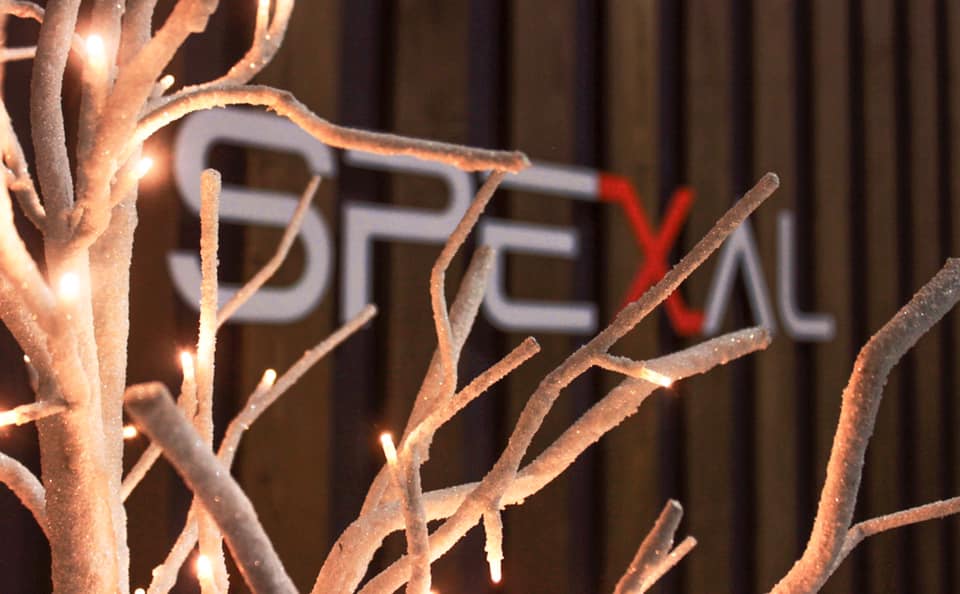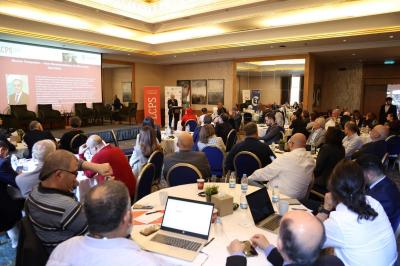As the world undergoes a structural shift toward smart manufacturing, robotics and artificial intelligence have become the cornerstones of industrial development across various sectors. In line with this global trend, Lebanon has marked its footprint into the smart industry arena with Spexal, the first factory of its kind in the country, specializing in the design, manufacturing, and programming of robots.
Amid Lebanon's ongoing economic challenges, this shift to advanced technology offers a golden opportunity to create added value and stimulate the growth of local industries. The factory recently welcomed an official visit from supervising Minister of Industry Georges Bouchikian, who expressed his admiration for Spexal’s technological advance and emphasized the importance of supporting this vital sector to achieve sustainable economic development.
A Lebanese Step Toward Advanced Industry
Located in Zalka (Mount Lebanon), Spexal is a pioneering institution dedicated to developing artificial intelligence and industrial robotics technologies, positioning itself as a leader in this field within Lebanon. As highlighted during the ministerial visit, the factory boasts a modern infrastructure, state-of-the-art equipment, and a team of engineers and experts in AI and robotics, enabling it to craft advanced technological solutions tailored to both local and global markets.
Following his tour, Bouchikian praised Spexal's cutting-edge facilities, stating that this initiative marks a promising start for smart industries in Lebanon. "This visit aims to explore the latest technologies and industrial innovations," he noted. "It’s impressive to see the level of modernity and progress in this industry, which firmly establishes Lebanon’s presence on the technological map."
The minister also stressed that each visit to Lebanon's tech factories underscores the country's efforts to keep pace with global industries, a critical factor in transforming the Lebanese economy into one driven by knowledge and advanced technology.
Role of Smart Manufacturing in Reviving Lebanon’s Economy
In an interview with Al Safa News, economist Dr. Khaldoun Abdel Samad highlighted the significance of establishing a cutting-edge robotics factory in Lebanon—not just for introducing new technologies to the local market, but also for its broader impact on the national economy. He outlined the project’s key strengths:
Boosting Lebanon’s Tech Sector: Spexal serves as a cornerstone for the future of smart industry in Lebanon, enhancing the country’s appeal as a destination for tech investments and encouraging startups and universities to invest in research and development.
Reducing Import Dependence and Boosting Exports: Lebanon has long relied on importing industrial technologies. With a local robotics factory, the country can narrow this technological gap, reduce import costs, and even generate additional revenue by exporting smart products to regional and global markets.
Creating Specialized Job Opportunities: Projects like Spexal create new employment opportunities in engineering, programming, and smart manufacturing, helping retain local talent and mitigate the brain drain of Lebanese professionals seeking better opportunities abroad.
Attracting Foreign Investments: Advanced facilities like Spexal are likely to attract global investors interested in tapping into Lebanon's technological expertise, especially given the rising global demand for smart solutions across industries.
Supporting Other Sectors Through Automation: Beyond its industrial role, Spexal can contribute to various Lebanese sectors, such as healthcare, by developing robots to assist medical teams, or education, by integrating AI technologies into curricula. It can also enhance service industries through automation, boosting productivity and cutting costs.
Broader implications of this Move
To delve deeper into the implications of establishing Lebanon’s first robotics factory, Al Safa News spoke with Elias Achkar, a digital transformation expert, who offered insights into Spexal's economic and technological significance. "This step represents a strategic shift, ushering Lebanon into the era of Industry 4.0," Achkar explained. "This concept revolves around AI technologies and industrial robotics. Amid economic crises, projects like these can provide a real alternative to traditional income sources and help position Lebanon as a regional hub for advanced technology."
However, Achkar also pointed out several challenges facing smart manufacturing in Lebanon:
Weak Digital Infrastructure: Lebanon needs to upgrade its internet network and technological infrastructure to support advanced projects.
Lack of Funding and Investment: Smart manufacturing requires substantial investments, which could be difficult to secure given the current economic climate.
Brain Drain and Talent Shortage: To prevent the emigration of skilled engineers and developers, Lebanon must create an attractive working environment.
Logistical and Regulatory Challenges: Updating laws and procedures to support tech startups is essential, including offering tax incentives and easing import/export processes.
The Future of Smart Industry in Lebanon: What Lies Ahead?
Spexal represents a positive step on Lebanon’s path to industrial transformation, but its sustainability and growth will depend on government and strategic support. Drawing from global experiences, the Lebanese government could adopt policies such as tax exemptions and research funding to ensure the sector's success.
Ultimately, the crucial question remains: Can Lebanon become a regional hub for advanced technology despite the challenges? If the country manages to develop a supportive investment environment and provide the necessary resources, the answer may well be yes. In the coming years, we could witness Beirut’s emergence as a center for technology and robotics in the Arab world.
Please post your comments on:
[email protected]
 Politics
Politics







